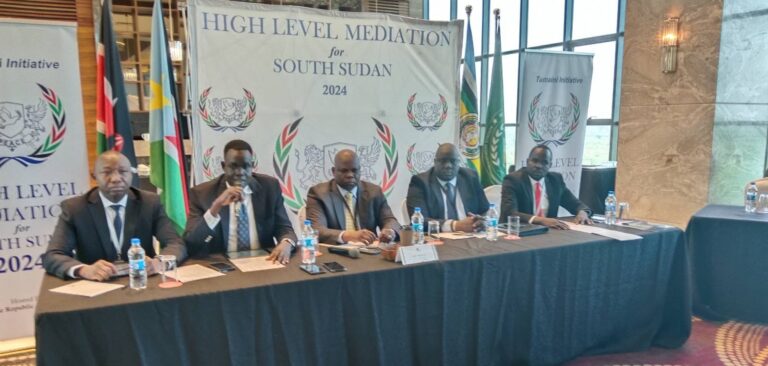South Sudan’s opposition groups have issued a joint statement responding to First Vice President Riek Machar’s recent concerns over the Nairobi peace talks.
On Thursday, Dr Machar wrote a protest letter to the chief mediator saying that peace talks in Kenya have failed to acknowledge the country’s peace agreement established in 2018, alleging a new draft agreement is aimed at replacing the original peace deal.
He pointed out that the draft established alternative institutions to replace or run in parallel with those established by the previous peace agreement. He added that the current peace talks should complement and not obliterate the original deal.
Machar and President Salva Kiir were on opposite sides in the war and Machar was appointed first vice president after the 2018 deal.
However, the opposition groups said in a Sunday statement that, right from the beginning, the purpose of the Nairobi talks has been determined to rescue South Sudan from crises.
According to the statement signed by Pagan Amum, Gen. Paul Malong, and Gen. Stephen Buoy, the opposition aims to address the root causes of the conflict in South Sudan by developing “a coherent and concrete rescue plan for South Sudan.”
“As the opposition, we are not here in the Tumaini Initiative to renegotiate, amend, and/or implement the R-ARCISS [Revitalized Peace Agreement]. We are here to discuss a Rescue Plan for South Sudan, particularly given the failure of implementation of the R-ARCISS by its principal signatories in the last six years in addition to three years of failures of ARCISS, making a total of 9 years’ loss,” the statement read in part.
It added, “This Rescue Plan may include, among others, aspects of unimplemented provisions and programs of the R-ARCISS.”
The opposition groups revealed that the new roadmap to rescue South Sudan comprises several elements, including trust building, establishment of an inclusive transitional government, security sector reforms, constitution-making process, robust implementation plan and carrying out national healing.
The opposition group believes the Tumaini Initiative will lead to permanent peace and stability in South Sudan.
Opposition groups that were not part of the 2018 peace agreement have been in talks in Kenya since May 9 aimed at bringing groups on board ahead of the elections. The negotiations are between President Salva Kiir and some holdout opposition groups.
The mediation is led by Gen Sumbeiywo, who also mediated the Comprehensive Peace Agreement (CPA) in 2005, which gave South Sudan autonomy and later led to a referendum for independence in 2011.
The talks have resulted in a draft agreement that recommends an extension of the transitional period to provide more time for election preparations.




